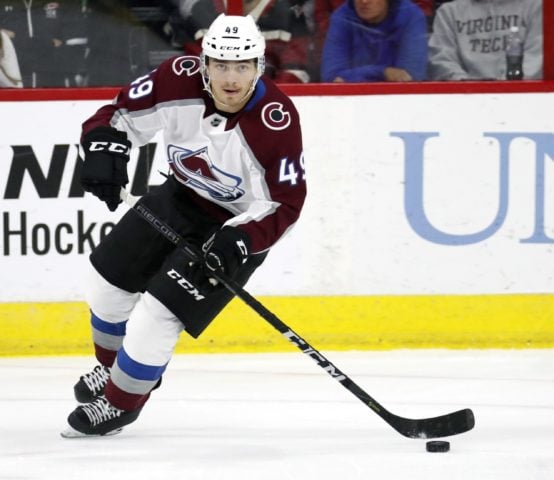On Tuesday night, Elliotte Friedman published the latest edition of his 32 Thoughts blog and suggested that the Colorado Avalanche are a “stealth” trade candidate to acquire Jakob Chychrun from the Arizona Coyotes. Such a move is admittedly a longshot, especially considering the quality and number of assets that the Coyotes could procure from other teams who can offer their full range of draft picks, as well as a number of promising prospects. Even if the Avalanche decide to pursue the struggling defenseman, is Chychrun worth the high acquisition cost and if so, is a blockbuster an optimal use of their limited resource pool? I say don’t pump the brakes just yet – let’s dig into why.
Chychrun Still One of the NHL’s Best Young Defensemen
Despite scoring a paltry two goals over 30 games this season, the 23-year-old Chychrun remains one of the NHL’s most promising offensive blueliners. Since the 2019-20 season, only five defensemen have potted more than Chychrun’s 32 tallies, and he’s also tied for seventh in total shots during that time (2.79 per game).
A look at his individual numbers at 5v5 tells an interesting story. It appears as though Chychrun is simultaneously very unlucky but is also haphazardly throwing pucks on the net in an attempt to manufacture offense.
| 2019-20 | 2020-21 | 2021-22 | |
|---|---|---|---|
| Shots/60 | 5.58 | 6.91 | 6.63 |
| Individual expected goals/60 | 0.23 | 0.33 | 0.25 |
| Individual high-danger attempts/60 | 0.21 | 0.88 | 0.11 |
| Shooting percentage (%) | 6.73 | 10.17 | 1.61 |
His shot rate, although slightly lower than last season, is still higher than his clip from two years prior. The discrepancy can be seen in the high-danger chance generation, where his per-60 value is the lowest of his career and has dropped precipitously year over year.
The most astonishing finding is his shooting percentage, almost a tenth of what it was last season at 5v5. Overall, his 2.2% conversion rate is a third of his career mark of 6.7% shooting and indicates that Chychrun is snake-bitten to an extent. His goals – and points – should see an uptick just based on the natural law of averages, but his trade value is at its absolute lowest right now.

The departure of Oliver Ekman-Larsson has forced Chychrun to adopt an even greater role in a woeful Coyotes’ offense, and his frustration with his weaker cast of teammates could be causing his aimless shot numbers. Rather than staying active in the zone and scouting for more opportune chances, he’s settling for low-percentage looks from the blue line. It can’t be enjoyable to operate within an impotent offensive framework, but Chychrun isn’t doing himself any favors with his shot selection.
Byram Injury Creates Blueline Need for Avalanche
After a turbulent rookie season in which he only played in 19 games due to understandable inconsistency and a spell with COVID, Bowen Byram looked to have taken a step in his sophomore season. He tallied 11 points in 18 games before stepping away from the Avalanche to address lingering concussion issues that threaten to derail a promising NHL career before it even gets off of the ground.
As a result, the Avalanche look to have a hole in their blueline, where a rotating cast of bottom-pair defensemen has functioned as a collection of dependable but unspectacular supporting pieces. Before beginning his leave of absence, Byram played almost 20 minutes a night, and his 18 minutes per game at even-strength meant he found a spot in Colorado’s vaunted top-four group. Without him, the team must hope that one or more of Erik Johnson, Jack Johnson, or Ryan Murray can step up into his spot. For a team with legitimate Stanley Cup aspirations, relying on a group of either aging or inconsistent defenders is quite the unsavory situation.
You May Also Like:
- Colorado Avalanche Won’t Be Contenders This Season
- Colorado Avalanche Lineup Projection for 2024-25
- Avalanche Giving Nikolai Kovalenko a Chance to Prove Himself
- 3 Avalanche Players With the Most to Prove in 2024-25
- Peter “Foppa” Forsberg: A Biography
Although Chychrun has been a break-even shot- and chance share player at 5v5 over his career, this season’s results are very worrisome. He’s dropped to a 44.5% share of expected goals and high-danger chances, and the Coyotes have been outscored 37-13 with him on the ice at 5v5. Some of that can be ascribed to Arizona’s goaltending and plain bad luck after two consecutive seasons of him being on the ice for over 52% of actual goals. Still, there’s an argument to be made that he’s lost a step defensively.
No matter how you slice it, a minus-24 goal differential suggests there’s something deeper at play. Colorado must figure out how much is due to external factors and how much can be pinned on Chychrun’s shortcomings as a player. That’s easier said than done, however.
Does Adding Chychrun Force Out Girard?
In the aftermath of Colorado’s disappointing second-round defeat at the hands of the Vegas Golden Knights, Samuel Girard was bandied about as a trade candidate due to his underwhelming performance on the Avalanche blue line. He scored three points in six games but finished the series as a minus-7, with Colorado being outscored 12-5 with him on the ice at 5v5. His slight stature and physical shortcomings were cited as reasons for adding his name to the team’s trade block, with some afraid that he is not built for the rigors of playoff hockey.
In comparison, the hulking Chychrun is a much more physical presence and could inject a different dimension into a somewhat homogenous Avalanche blueline. While the likes of Cale Makar, Devon Toews, and Girard play a more expansive and fluid style, Chychrun is a more heavy, direct type of player. He obviously lacks any comparable postseason experience, given that he’s only played for Arizona during his NHL career, but that is more of a comment on the state of the Coyotes than Chychrun’s capabilities.

Girard’s position and contract ($5 million per year through 2026-27) mean he is the likely salary makeweight, but he’s locked up through his prime with cost certainty. His deal expires as he hits age 30, and it’s a very team-friendly pact, one that the Avalanche should loathe relinquishing if they hope to continue mining positive value throughout the lineup.
Now, I am a big fan of Girard and cringe at the thought of parting ways with a supremely talented defender because he had a poor playoff series at the age of 23. I see the appeal for Chychrun, but the Avalanche should be wary of selling low on Girard stock, even as he chugs along at a 50-point pace this season. I doubt that Chyrchun’s physicality and big shot mitigate the loss of one of the NHL’s best transition players, making the opportunity cost much too high in my eyes.
Can the Avalanche Afford Chychrun?
In terms of pure cap hit, absolutely, as Chychrun only counts for $4.6 million against the cap for four more seasons, and his salary could be further reduced after single- or double-retention. If Girard or the versatile J.T Compher ($3.5 million cap hit through next season) are included, the salaries match up.
If the Avalanche were to go down the route of double salary retention, an asset or two would have to be given to the cooperating third party, further diminishing Colorado’s pool of picks and other trade capital. The length on Chychrun’s deal means that the retention lasts further into the future, costing the Avalanche more to entice teams to hold dead cap on their books several years down the road.
In terms of asset costs, a bidding war is likely to erupt for a young depreciated asset with a cheap contract for the foreseeable future. The Avalanche hold their own first-round picks in 2023 and 2024, but those should end up being late firsts and are much less appetizing for a rebuilding club looking to accrue more significant value in a sellers’ market. Arizona owns seven picks in the first two rounds of the 2022 Entry Draft, and they look set to compile even more as they auction off their numerous pending free agents.
Colorado can dangle several noteworthy prospects, including Oskar Olausson, Justin Barron, and Alex Newhook, but other organizations could fashion a stronger overall offer. Unless management is willing to mortgage the future to outbid the field, it’s difficult to envision Chychrun making his way to Denver.
Should the Avalanche Trade for Chychrun?
Adding a defender of the caliber of Chychrun undoubtedly improves almost every lineup in the NHL, including Colorado’s, but whether acquiring the blueliner is the optimal use of finite assets is another discussion. Despite sitting first in the NHL as of this writing, the Avalanche must address several pressing issues before the 2022 Playoffs. With only so many bullets in the chamber, should general manager Joe Sakic use his on a slumping, but infinitely talented, rearguard? Maybe not, but with heightened expectations permeating the atmosphere of Ball Arena, Sakic isn’t doing his job if he doesn’t at least do his due diligence on a potential trade. Does Chychrun get the Avalanche over the second-round hump?
Data courtesy of Hockey Reference, MoneyPuck, Natural Stat Trick, and the NHL.